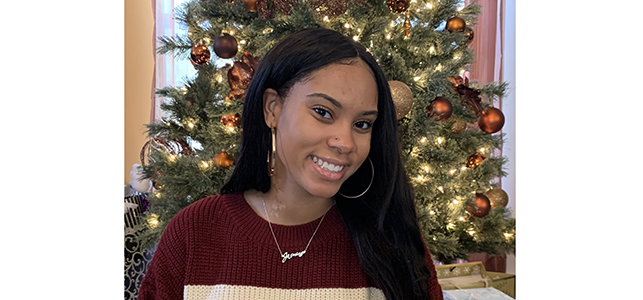
The ECMO care that helped save Jasmine
Twenty-two years ago Lisa Woody was pregnant with her first child. Near the end of her first trimester a screening test revealed her unborn daughter, Jasmine, had a congenital diaphragmatic hernia, a hole in the diaphragm that can cause the bowel, stomach and liver to move into the chest cavity and lead to long-term respiratory, circulatory, feeding and developmental problems. Lisa was referred to a specialist at VCU Medical Center where she delivered Jasmine in May 1999. Immediately after birth, Jasmine was brought to our neonatal intensive care unit and placed on a life sustaining ECMO machine until she was stable enough for surgery to repair the hernia.
“It was a very emotional time,” Lisa remembered of the period surrounding Jasmine’s birth. “She was my first baby, and I never anticipated anything being wrong. It was such a shock.”
Developed in the 1970s, ECMO stands for extra-corporeal membrane oxygenation. As many as 20 health care providers are needed to place a baby on ECMO including pediatric surgeons, NICU doctors, nurses, respiratory therapists, perfusionists and ECMO specialists. ECMO also requires support from blood bank, laboratory, pharmacy, social work and chaplain team members.
An ECMO machine is composed of many parts including a pump to circulate blood, an artificial lung to add oxygen and remove carbon dioxide, and a heater to warm the blood. On average, patients remain on ECMO about a week, or until the underlying heart or lung problem is resolved. In Jasmine’s case, she was connected to ECMO for two weeks during which time Lisa was only able to rub Jasmine’s head and hold her finger.
On May 26, 1999, Jasmine had surgery to repair her hernia, which Lisa said surgeons called the largest hernia they had ever seen on a baby in the NICU. After surgery, Jasmine continued to require another six weeks of intensive care.
Marking 40 years of ECMO at CHoR
Forty years ago, CHoR became the third health center in the U.S. to treat patients using ECMO and is the only ECMO center in central Virginia. We’ve also been recognized with a Gold Level ELSO Award for Excellence in Life Support from the Extracorporeal Life Support Organization. While the majority of ECMO patients are treated in the NICU, ECMO is also used in the PICU, cardiac surgery ICU and coronary ICU. We even have a dedicated ground ambulance and helicopter flight program to transfer patients who require ECMO from community hospitals.
Sharon Cone, PhD, RNC, NNP served as CHoR’s ECMO coordinator for many years and remains actively involved through her role as NICU nurse manager. She described our ECMO team as a “well-oiled machine.” Given the volume of ECMO cases and the expertise and commitment of all team members, Sharon said they’re able to anticipate the needs of critically ill patients swiftly when moments count.
Coming full circle – Jasmine plans a health career working with kids
Lisa has stayed in touch with Sharon and some of the other team members who were part of Jasmine’s care team. She spoke about her NICU experiences during the groundbreaking for VCU Health’s critical care tower in 2005 and has accompanied Jasmine to multiple NICU reunion events over the years.
Since childhood, Jasmine has wanted to work with infants or children. Last year she completed a five-month recreation therapy internship at CHoR. Today she works as a therapeutic assistant at a local facility for children and adults with eating disorders.
“Being a recreational therapist allows me to help kids,” said Jasmine, who graduated from Old Dominion University in 2020 and is interested in returning to school to become an occupational therapist. “Medical play helps patients recover and get to a better place.”
While showing off the scar on her neck from the ECMO machine, Jasmine admitted that she didn’t understand the severity of her condition when she was younger.
“The ECMO machine saved my life,” Jasmine acknowledged. “I’ve always been so thankful for the hospital and the staff who were there for my parents. Without ECMO, my heart wouldn’t have been strong enough for surgery.”
